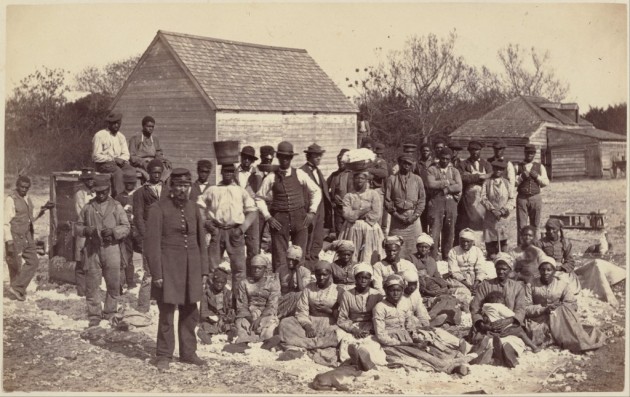
Slaves on a plantation pose with their slavemaster, but only 8 percent of present-day high school seniors could identify slavery as a central cause of the Civil War, according to Teaching Hard History, a study released for Black History Month, by the Southern Poverty Law Center. Courtesy photo.
WASHINGTON –Howard University Professor Gregory Carr knew many Americans, including African Americans, didn't know enough about slavery, its origins and its impact on the U.S. and the world. Still, even Carr, chair of the Department of Afro-American Studies, was surprised at the results of a study on what children in the nation's schools know about the subject.
According to the study, only 8 percent of the high school seniors identified slavery as the cause of the Civil War. Nearly seven out of 10 seniors did not know that the 13th Amendment to the Constitution formally ended slavery. Most thought it was the Emancipation Proclamation. Less than 50 percent knew that abolitionist, author and orator Frederick Douglass was a former slave. A major problem was the textbooks teachers used to teach the history of slavery.
The study, Teaching Hard History, was produced by Teaching Tolerance, a program at the Southern Poverty Law Center. Teaching Tolerance began studying the issue in December 2016. Researchers sent out 1,000 online surveys to American high school seniors through Survey USA. Teaching Tolerance also surveyed more than 1,500 public school teachers, teaching grade levels kindergarten through 12th grade. The survey focused on their attitudes and perceived readiness to teach the topic of slavery.

Greg Carr, an associate professor of Africana Studies, chair of the
Department of Afro-American Studies at Howard University and an adjunct
professor at the Howard University School of Law, said he was not surprised
at the lack of black history being taught in public schools. Courtresy photo.
It concluded that not only do students lack a fundamental knowledge of slavery, but teachers also lack the necessary training to educate their students on the subject matter.
Teachers across the board responded that “at least one facet makes them uncomfortable,” when teaching slavery. This leads some teachers to resort to classroom “simulations,” where students act out or are treated as slaves. Teaching Tolerance warns that these simulations can be particularly dangerous.
Additionally, textbooks also failed when measured against a standard rubric created in order to measure their engagement with “slavery’s key concepts,” the report said.
The best classroom textbook used by instructors to teach about the institution that was the economic backbone of America for over 200 years scored only 70 percent against the rubric of what should be included in the study of American slavery. The average score of textbooks used to teach the subject was 46 percent. Textbooks from Texas and Alabama, two of the nation's biggest slave-holding states, scored just 6 out of the 87 total possible points.
The report found that textbooks and instructors choose to focus on the positives of slavery. Heroes such as Frederick Douglass and Harriet Tubman are taught to students before students understand “the full, painful context of slavery,” written in the report as one of the key problems with the instruction of slavery
“Teachers are extremely overworked and severely underprepared in terms of content mastery,” Carr said.
More funding is needed in order to adequately prepare teachers to teach such difficult topics, he said. He also suggests that school districts should “devote time during the year to building teacher capacity.”
An understanding of slavery is vital to understanding America and slavery’s connection to white supremacy and present-day events, he said.
“The labor force that put the economic foundation under the enterprise was enslaved Africans, which means everything that happened after that is a conversation about slavery,” Carr said. Karen Miller, an assistant adjunct professor in the Howard University School of Social Work said when African Americans fail to understand slavery, they fail to connect to a vital part of their personal history. Consequently, she said, “there is just not a good sense of self.”
Miller said she finds that many of her graduate students at a historically black university lack fundamental knowledge of slavery, an institution that is crucial to their identity.
“It’s important for them to know the struggle, because it helps you to navigate life in a way that assists in understanding what we have to do to navigate life here in the United States,” she said.
Teaching Tolerance released resources to help educators teach slavery at no cost. The resources may be accessed here.
View the full report, Teaching Hard History, here.





